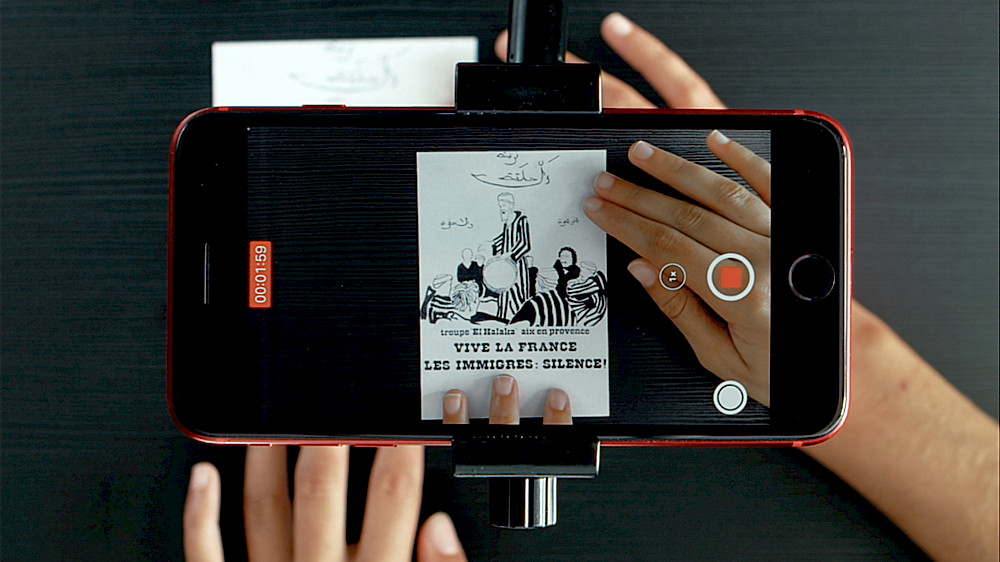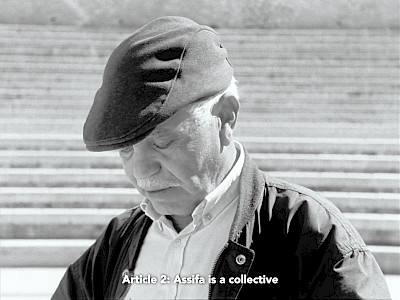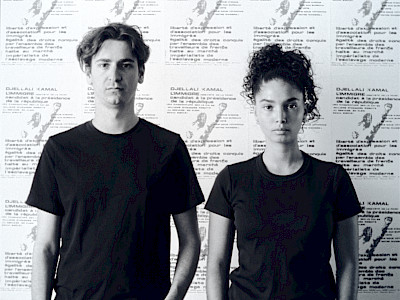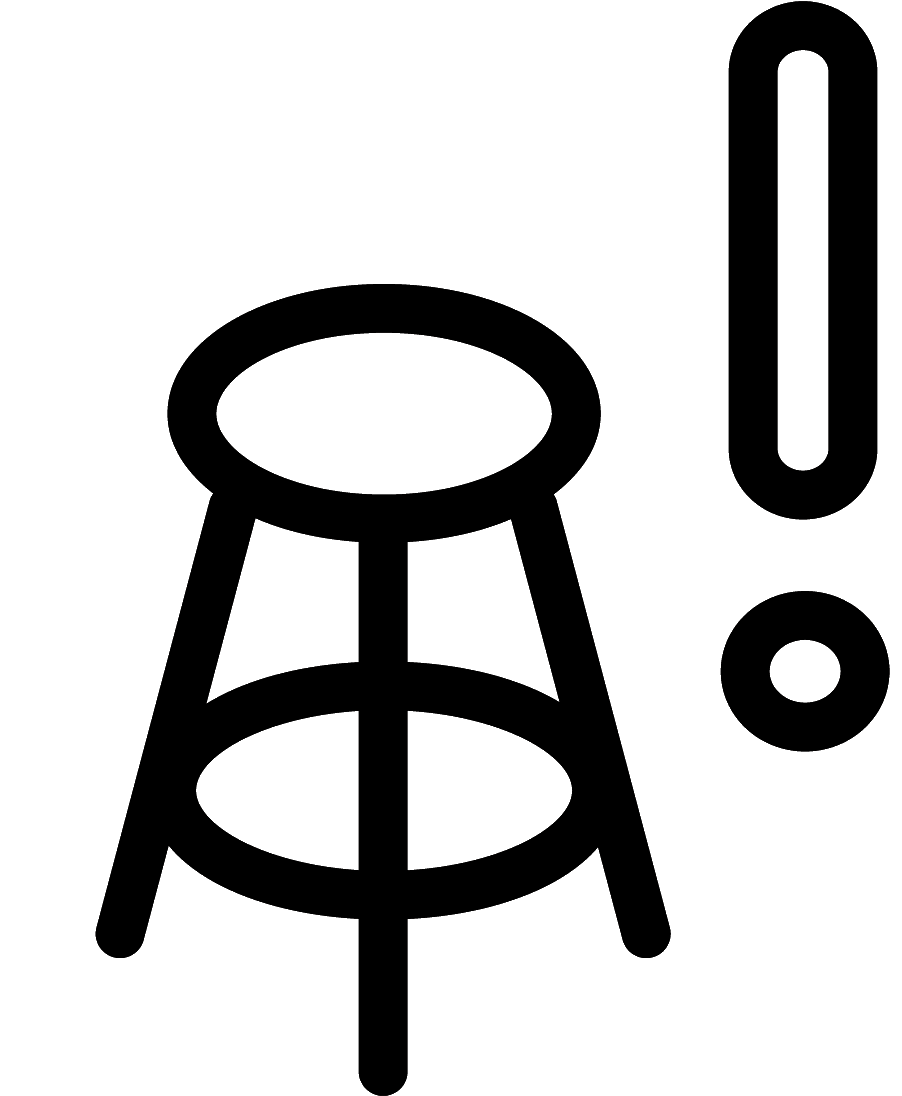27.05 — 01.06.2024
In 1974, amidst a hunger strike by undocumented workers in Paris, the Movement of Arab Workers created a singular political action: presenting a candidate for the imminent presidential elections. They chose a member of their Al Assifa theatre group, an 18-year-old Tunisian hunger striker using the pseudonym Djellali Kamal. The campaign was conceived as a public performance highlighting the denial of civil rights to migrants and projecting self-agency. Artist Bouchra Khalili now creates a video installation, consisting of two video works that form a unique dialogue reconnecting distant geographies and times. With The Circle, she reconstructed the incredible adventure of this powerful action from fifty years ago. With The Public Storyteller, a new commission by the festival, she films a halqa, a centuries-old practice of public storytelling in Morocco, to people arranged in a circle. In this halqa, Djellali’s campaign is narrated by a storyteller in Marrakesh, implicitly forming a new circle linking the diaspora and North Africa. What does this gap between 1974 and 2024 tell us, a few days before a new election? How can invisibilised identities become visible? Khalili emphasises the importance of remembering past political strategies as a practice of intergenerational transmission for the present and future.
An inviting space of appearance
The Circle & The Public Storyteller
“For those who are with us,
for those who are no longer with us
and for those who will join us.”
The Circle and The Public Storyteller are directly tied to Bouchra Khalili’s previous work, as they conclude her comprehensive research initiated in 2012 on the restitution of the silenced legacy of the Movement of Arab Workers (MTA) and its theatre groups Al Assifa (The Storm) and Al Halaka (The Circle), in France. In Kunstenfestivaldesarts 2020 Khalili already presented An Audio Family Album, a sound work that links itself with the ways in which Al Assifa created conditions for stories and information to circulate in diasporic circles, forming a living online family album* of voices and acoustically repairing memories of a shared struggle for equality.
The Circle shares its starting point with The Tempest Society (2017), an earlier video work of Khalili dealing with the legacy of the MTA and its theatre company Al Assifa. In The Circle, she evokes the beginnings of the political engagement of Al Assifa and Al Halaka’s members, bringing back their forgotten histories in an unprecedented way – their traces, images, and founding actions – permitting them to resonate in our present moment.
The Circle invites the three civic poets** of The Tempest Society to hand over, in a gesture of solidarity, their task of creating a constellation of stories and newly found relations of equality to two new storytellers: Mia Radford and Lucas Yahiaoui, two young French Maghrebi living in Marseille. In their strategic and poetic search for ways of rendering oneself visible, a haunting space of appearance comes into being through well situated storytelling – measuring the distance between us and them, now and then.
In their quest for visibility inherited from Al Halaka and Al Assifa, Mia and Lucas come to embody Djellali Kamal, the pseudonym of a member of the MTA and Al Assifa who was the immigrant candidate for the presidential elections of 1974 in France, known for his participation in a series of hunger strikes. Organized by the MTA, the hunger strikes contested the Marcellin-Fontanet circulars that tied residence permits to evidence of employment and a certificate of decent housing. Members of both MTA and Al Assifa participated in the hunger strikes. Through this process of becoming, Bouchra Khalili invites the storytellers to question how to render visible the invisibilised, those erased from history. She proposes them to by re-appropriate the impossibility of representation through performance. The two storytellers appear as a poets celebrating shared epics and heroes – and by doing so preserving collective memory. Surviving members of Al Assifa and Al Halaka (Hedi Akkari, Philippe Tancelin, Mustapha Mohammadi and Smaïne Idri) make their regular appearance in The Circle as well, re-enacting their own performances both simultaneously as witnesses and protagonists of a silenced struggle for equal rights.
With The Circle, Khalili continues to re-invent theatrical languages through cinema. She articulates montage and mise-en-scene as means of Brechtian distance-effects renewing her own filmic language in dialogue with performance: as much theatrical as rooted in the Maghrebi tradition. For The Circle, Bouchra Khalili delves into the power of performance as a cinematographic device, with two core moments. First, through the performance of a hunger strike, where the damned of the earth recourse to their body as ultimate weapon of protest against dehumanization: ready to “pay with their blood, with their lives, so they don’t have to pay with their humanity”, as stated in the theatre play One Works, Works and Shuts Up by Al Assifa. During these historical hunger strikes, the damned emerged from what Frantz Fanon called the zones of non-being, to appear in full daylight. Second, through Djellali Kamal, the presidential candidate rising out of the hunger strike. A performative pseudonym rendering the struggle out of damnation visible through a common name, as well as invoking a presence marked by two haunting absences.
Firstly the absence of Djellali Ben Ali, a fifteen-year-old Algerian boy who was assassinated in a racist attack in October 1971, at the Goutte d’Or district of Paris. It formed the first, but unfortunately not the last racist crime to mobilize the masses of Maghrebi workers in France. Then, the absence of Kamal, a member of the MTA engaged in the hunger strikes, who was expelled from France and fled to Belgium. Together with other Maghrebi workers, Kamal started another hunger strike on the 22th of March 1974, this time in the Saints-Jean-et-Nicolas church in Schaerbeek, to mobilize for the right to work and residence. The strike went on until, by order of the Minister of Justice, the police arrested Kamal and eleven other hunger strikers on the 1st of April, to send them back by charter plane to Morocco and Tunisia.
With The Public Storyteller, a new video installation created for the festival, Bouchra Khalili loops the story back to its formal origin by filming a halqa (a publicly staged story where the storyteller speaks in the middle of a circle formed by the spectators). Djellali’s appearence and his campaign come to us through the narration of a young storyteller (called a qisawi, or halqia in Morocco). Through the speculative re-enactment of this performative speech act, light shines through the crack made in the public discourse by Djellali Kamal. It allows a multiplicity of silenced voices to resonate, restoring and healing diasporic relations by re-framing what can be felt, said or seen in postcolonial France.
Using montage as a polysemic and auto-reflexive form of re-arrangement in her films, Bouchra Khalili elaborates “a constellation of equality”, mediated by stories and the interventions of her civil poets. They incorporate the power of performance to complete the repertoire of possible gestures to claim visibility. By doing so, they break away from various forms of damnation, embodying diasporic community and history beyond the many pitfalls of representation.
Through the images rising out of the shared fragments of these lost stories, an open but haunting encounter emerges – not only between the different protagonists, witnesses and civic poets animating the video-installation, but also in relation to the damned that did not survive the accumulating histories of erasure. Khalili’s video-installation therefore allows for the performance of a particular space of appearance, an endlessly renewed encounter between the audience, “those who are with us” and “those who are no longer with us”, but also with “those who will join us”, a dedication as a gesture of solidarity, always moving and making us move anew at any point in time, between us and them, here and then, in unforeseen directions.
- Joachim Ben Yakoub, May 2024
Joachim H. Ben Yakoub is a writer, researcher and lecturer operating on the border of different art institutions and schools in between and beyond Tunis and Brussels. He finds refuge in The Kitchen, a shared place in the center of the capital, where they hang out, cook and gossip, where they broadcast, reprint and study.
* audiofamilyalbum.com
** The figure of the civic poet, as imagined by Pier Paolo Pasolini, takes on the responsibility to speak “as close as possible to those who are silenced or absent, and to testify in their name”. This discursive dispositive serves as an act of resistance against historical injustice.
Presentation: Kunstenfestivaldesarts, KVS
Concept: Bouchra Khalili
The Circle
2023. Mixed media installation comprising the synchronised dual projections with the same title, The Storytellers (five 16 mm films transferred to video displayed on monitors), and the mural paper Timeline for a Constellation.
An installation by Bouchra Khalili | Directed by Bouchra Khalili | Produced by Bouchra Khalili and Alexandre Kauffmann | Line producer: Michel Balagué – Volte Films | With (by order of appearance): Isavella Alopoudi, Giannis Sotiriou, Elias Kiama Tzogonas, Mia Radford, Lucas Yahiaoui, Mustapha Mohammadi, Hedi Akkari, Philippe Tancelin, Abdellali Hajjat, Rocé, Smaine Idri | Cinematographer (16mm film and digital film): Delphine Ménoret | Editor: Bouchra Khalili | Sound recording and engineering: Johannes Schmelzer-Ziringer | Assistant director: Anouk Moyaux | Analog filming consultant: Jake McCarthy Wiener | Camera assistant: Lauren De la Borie | Research assistant: Isabella Seniuta | Production coordinator and location manager: Maxime Mudjeredian | Production assistant: Ariel Mestron | Sound design and sound mix: Johannes Schmelzer-Ziringer | 16mm film scan technician. Le Polygone étoilé, Marseille: Adrien Von Nagel | Primary digital grading: Ben Brix | Digital grading and conforming: Artem Stretovych, The Post Republic | Commissioned by Sharjah Art Foundation, MACBA Barcelona, Luma Foundation
The Public Storyteller
Commissioned and coproduced by Kunstenfestivaldesarts and Sharjah Art Foundation | Co-commissioners: Festival d’Automne à Paris
Production: Bouchra Khalili, Alexandre Kauffmann




